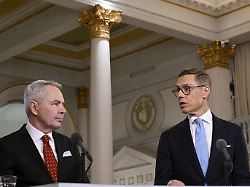Kremlin is closely monitoring the decision
Finland elects a new president
February 11, 2024, 6:22 a.m
Listen to article
This audio version was artificially generated. More info | Send feedback
Sauli Niinistö has been Finland’s president since 2012. However, he is not allowed to run again in Sunday’s election. Instead, the decision falls between two political heavyweights. People in the Kremlin are also likely to be following the election evening closely.
A young woman and a man in their mid-70s have represented Finland on the international stage in recent years. Sanna Marin, who was appointed the world’s youngest head of government in 2019, and President Sauli Niinistö gave the EU’s northernmost country a face in a troubled world and, after the Russian invasion of Ukraine, led it straight into NATO. Despite Marin’s popularity, someone else took over at the top of the government shortly after joining NATO – and a new man will now take charge at the top of the state.
This Sunday it will be decided who will become Finland’s new president and thus take over the political legacy of the extremely popular Niinistö. After a total of twelve years as head of state, the 75-year-old, who is considered one of the architects of Finland’s accession to NATO and has distinguished himself as a cross-party, unifying voice, was not allowed to run again. His successor will be either Alexander Stubb or Pekka Haavisto: The conservative former head of government and the Green ex-foreign minister received the most votes of all nine candidates in a first round of elections two weeks ago, but each missed a direct majority in the first attempt. That’s why there is a runoff between them – with Stubb in the slight favorite role.
Further clear edge against neighbor Russia
A few years ago, Finnish politics were at most a marginal note in the world public. Then came Marin, and then the Russian attack on Ukraine was followed by the Finnish decision to apply for NATO membership after decades of military non-alignment. Finland showed a clear edge compared to its large, complicated neighbor to the east; all East-West balances of the past were outdated. At the beginning of April 2023, the Nordic country was accepted into the defense alliance. The major powers thanked the Finns in different ways: While US President Joe Biden Niinistö paid a visit to Helsinki in the summer of 2023, the Russian authorities later allowed numerous migrants to the Finnish border in order to cause problems for the neighboring country.
Election evening will also be followed closely in the Kremlin, after all it is about a neighbor with whom we share a 1,340 kilometer long border. At the same time, it should be clear that Finnish-Russian relations will not change much anytime soon. “I don’t think there will be a big change under either of them,” assesses University of Helsinki professor and political economy expert Jari Eloranta. “Stubb would be a very pro-European president who would probably place a lot of value on Anglo-American cooperation.” Haavisto is also very pro-European, but a little more cosmopolitan. “He would perhaps elaborate a little more on Finland’s role in the global south.” When it comes to Russia, however, Eloranta is certain that neither candidate will deviate from the previous line and continue to show a clear edge towards Russia.
Stubb is slightly ahead of Haavisto in polls
Stubb and Haavisto are considered political heavyweights in Finland. Stubb was Prime Minister from mid-2014 to mid-2015 and held various ministerial posts before and after. As a candidate for Prime Minister Petteri Orpo’s conservative National Coalition Party, the 55-year-old received 27.2 percent of the vote in the first round of voting, 1.4 percentage points more than Haavisto. Most recently he was a professor at the European University Institute in Florence. He said in his podcast “Alex Talk” that he would miss the academic freedom to say whatever he wanted if he were elected. It feels very liberating to say things that a president could certainly never say. He could now forfeit this freedom for the highest office in his country. “I think Stubb is definitely the favorite,” says Eloranta. Polls also see the conservatives ahead of Haavisto by a few percentage points.
Haavisto has already tried his luck in the last two presidential elections – both times he came second to Niinistö. The 65-year-old belongs to the Green Party, but this time he ran for the presidency as an independent. Under Marin he was Finnish Foreign Minister and in this capacity he also signed Finland’s NATO accession document – it was the highlight of his long political career so far. In Finland, the president is elected for a six-year term and, unlike in Germany, directly by the people. It also plays a more active political role than in many other European countries: one of its most important tasks is to decide, together with the government, on the country’s foreign and security policy. However, he largely stays out of domestic politics.
